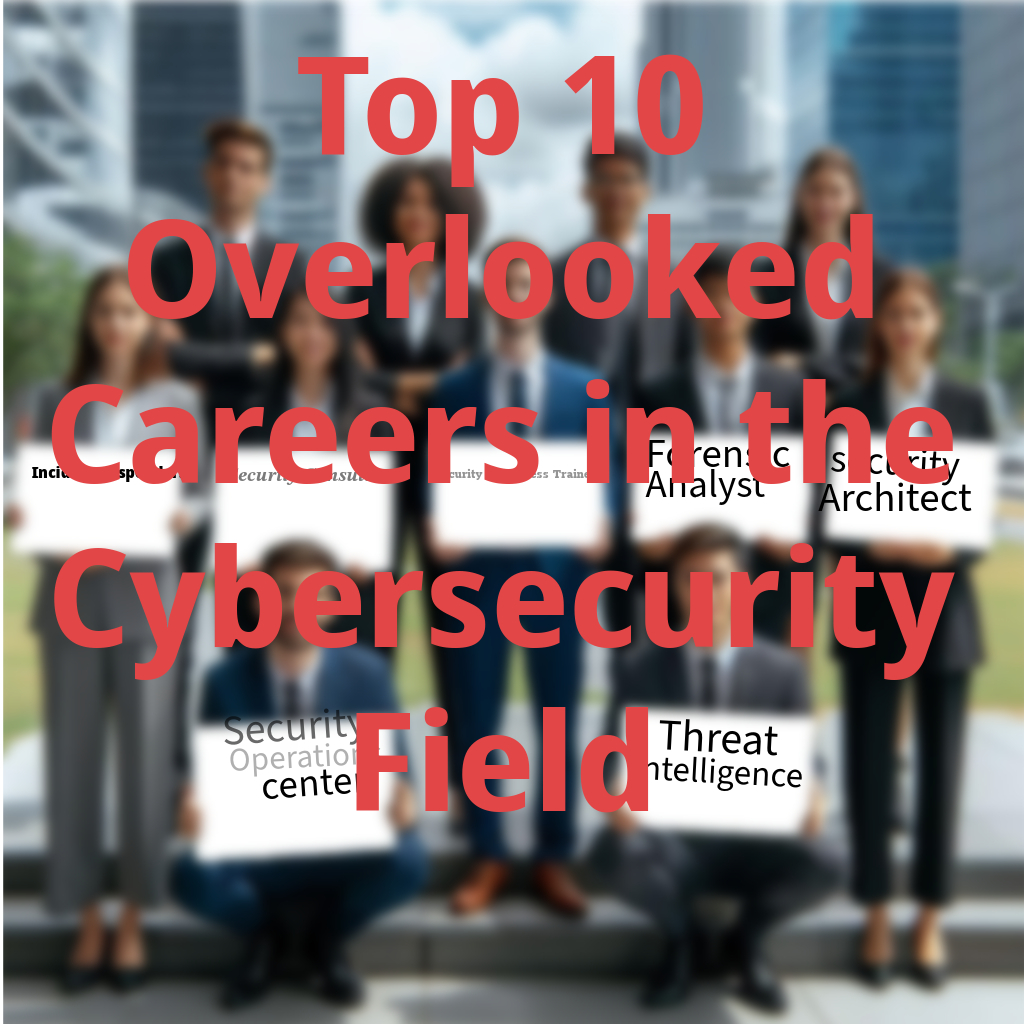Cybersecurity is an evolving field as it constantly offers many exciting career paths. While some roles, such as penetration testers and security analysts, are well-known and popular, others are less visible but equally important.
In this blog post, I’ll show you some great cybersecurity careers that are essential for safeguarding our digital world that is unknowingly overlooked.
1. Incident Responder:
Incident responders defend organizations from hackers and cybercriminals and help them recover from security breaches. They are the ones who identify, investigate, and resolve security incidents as efficiently and effectively as possible. They use forensic tools and techniques to understand the nature, extent, and origin of the attack, and implement countermeasures to stop further damage. They also work with other teams and stakeholders to restore normal operations and enhance security posture.
However, incident responders are often overlooked for several reasons:
– Lack of awareness: Many people are unaware of what incident responders do or how they differ from other cybersecurity professionals, such as SOC analysts, forensic experts, or penetration testers. Incident responders require a broad and deep knowledge of cybersecurity, as they handle various types of incidents and threats. They also need strong analytical, problem-solving, and communication skills, as they work under pressure and coordinate with different parties.
– Lack of education: There are few formal education programs or courses that specialize in incident response. Most incident responders acquire their skills and knowledge through on-the-job training or self-study. They may also obtain certifications, such as the GIAC Certified Incident Handler (GCIH) or the EC-Council Certified Incident Handler (ECIH), to demonstrate their competence. However, these certifications are not widely recognized or required by employers, and they may not encompass all the aspects of incident response.
– Lack of recognition: Incident responders often work in the background and do not receive much recognition or appreciation for their work. They may not earn the same level of compensation or career advancement as other cybersecurity professionals, who may have more visible or tangible outcomes. Incident responders may also experience burnout or stress, as they face high-pressure situations and constant challenges.
2. Security Consultant:
Security consultants are professionals who help organizations enhance their security stance by identifying and resolving vulnerabilities and recommending best practices. They have the benefit of working with different clients and sectors, which gives them a comprehensive and in-depth understanding of security risks and solutions.
However, many organizations overlook this career option in cybersecurity, due to these misconceptions:
– Some organizations may believe that security consultants are too costly and that they can manage security issues by themselves or with their current staff. This can be a risky strategy, as security consultants can help avoid expensive breaches, penalties, and reputation loss by providing specialized advice and solutions.
– Some organizations may worry that security consultants will disrupt their operations, reveal their secrets, or force unwanted changes. However, security consultants are governed by professional standards and confidentiality clauses, and they cooperate with their clients to comprehend their needs and objectives, and to customize their services accordingly.
– Some organizations may presume that security consultants provide generic or standard solutions and that they lack the specific skills or knowledge needed for their industry or domain. However, security consultants have a diverse range of expertise and experience, and they can adjust to different situations and problems, and provide creative and tailored solutions.
3. Security Awareness Trainer:
Security awareness trainers educate employees on best practices, raising awareness about potential threats and promoting a security-conscious culture within the organization.
Many people think that cybersecurity is all about technical skills and tools, but they overlook one of the most important aspects: human behavior. Cyberattacks often exploit the weaknesses and mistakes of employees, such as clicking on phishing links, using weak passwords, or sharing sensitive information. That’s why security awareness trainers are essential for any organization that wants to protect its data and reputation.
Security awareness trainers are the ones who teach employees how to avoid common pitfalls, recognize and report suspicious activities, and follow the security policies and procedures. They also help to create a culture of security awareness, where everyone understands their role and responsibility in keeping the organization safe. Security awareness trainers are not just educators, but also influencers and motivators who can make a difference in the cybersecurity posture of an organization.
4. Forensic Analyst:
Forensic analysts use advanced tools and methods to collect and examine data from computers, networks, and other devices that are involved in cyber incidents. They help identify the source, type, and scope of the attack, as well as the harm done and the potential threats. Their findings are essential for legal actions and improving security measures.
There are two possible reasons why forensic analysis is often overlooked in cybersecurity:
1. Forensic analysis is seen as a reactive rather than a proactive measure. It comes into play after a cyberattack has occurred, not before. Some people may think that forensic analysis is less important than preventing or modifying cyberattacks in the first place. They may also prefer the more glamorous roles of ethical hackers, security engineers, or consultants, who are on the front lines of cybersecurity.
2. Forensic analysis requires a high level of technical skill, experience, and certification, which may limit the pool of qualified candidates for this role. Forensic analysts need to master various software and hardware products, information systems, and networking systems, as well as have a strong understanding of legal and ethical issues related to digital evidence. These skills are hard to acquire and maintain and may pose a challenge for aspiring or current forensic analysts.
5. Security Architect:
Cybersecurity architects are the unsung heroes of the digital world. They create and maintain the systems and networks that protect our data and devices from hackers and malware. They make sure that security is built into the infrastructure from the start, not added as an afterthought. Without architects, cybersecurity would be like building a house without a blueprint or a foundation.
Cybersecurity architecture is an overlooked career because:
– It is a complex and challenging field that requires a high level of technical expertise, creativity, and problem-solving skills.
– It is often seen as a background or supporting role, rather than a frontline or visible one, in the cybersecurity field.
– It is not well understood or appreciated by other stakeholders, such as business leaders, developers, or end-users, who may have different priorities or expectations.
– It is constantly evolving and adapting to new threats, technologies, and regulations, which may create uncertainty or stress for the architects.
– It is not a widely recognized or standardized profession, and there may be a lack of clear career paths, training opportunities, or certifications for the architects.
6. Security Operations Center (SOC) Analyst:
One of the most underrated careers in cybersecurity is that of a SOC analyst. A SOC analyst is responsible for keeping an eye on the network and detecting any potential threats or breaches. They also have to act quickly and effectively to contain and resolve any incidents that occur. A SOC analyst works closely with other security experts and teams to ensure the organization’s security posture is always up to date and robust.
SOC analyst is an overlooked career because:
– Many people confuse SOC analyst with other jobs, like cybersecurity analyst or penetration tester.
– SOC analyst has to constantly monitor and respond to cyber threats in real-time
– Requires a diverse set of skills: critical thinking, technical analysis, incident response, and collaboration
– Cyberattacks are becoming more frequent and complex, but many organizations are not prepared to deal with them. They do not have a dedicated SOC team or enough SOC analysts to monitor and respond to cyber threats in real time. This is because they lack the budget, resources, tools, and processes to support a SOC team.
7. Threat Intelligence Analyst:
Threat intelligence analysts are the ones who collect and analyze data on the current and future cyber threats and provide useful insights and recommendations to help organizations defend and respond to them.
However, threat intelligence analysts are not always recognized or valued in the cybersecurity industry. These are:
– Threat intelligence is a fairly new and developing field that needs specific skills and knowledge. Many organizations are not aware of what threat intelligence is, how it can help them, and how to use it effectively.
– Threat intelligence analysts operate in the background, collecting and analyzing data, and sharing insights and recommendations with other security teams and stakeholders. Their work is often invisible or unnoticed, and they may struggle to convey their findings and value to others.
– Threat intelligence analysts have to handle a huge and varied amount of information, from different sources and formats, and with varying degrees of reliability and relevance. They have to sift through the irrelevant, spot the important, and focus on the most urgent threats. This is a challenging and complicated task, especially when the cyber threats are constantly changing and evolving.
8. Compliance Analyst:
Compliance analysts are responsible for ensuring that an organization follows the rules and standards that apply to its cybersecurity operations. These rules and standards may vary depending on the type and size of the organization, the nature and scope of its data, and the countries and regions it operates in. Compliance analysts need to be aware of the latest changes and updates in the regulatory landscape, and how they affect the organization’s security policies and procedures.
Why compliance analysts may be overlooked are:
– Compliance analysts are often seen as rule-followers, rather than problem-solvers, innovators, or leaders. They may not get the recognition or respect that they deserve for their work.
– Compliance analysts may face challenges such as limited resources, conflicting priorities, and resistance to change. They may have to deal with complex and dynamic regulations, as well as internal and external stakeholders with different expectations and agendas.
– Compliance analysts may not have the same level of technical skills or knowledge as other cybersecurity professionals, such as hackers, coders, or encryptors. They may be perceived as less competent or relevant in the field.
9. Security Automation Engineer:
Security automation engineers create and deploy automated systems that take care of the mundane and repetitive security tasks, such as scanning, patching, and monitoring. This frees up the time and energy of the human security professionals, who can then concentrate on the more challenging and strategic aspects of cybersecurity, such as threat hunting, incident response, and risk management.
However, this career is often overlooked in cybersecurity, as many people assume that automation will replace human skills and creativity. On the contrary, automation enhances human capabilities and enables security teams to work more efficiently and effectively.
10. Identity and Access Management (IAM) Specialist:
If you think of an organization as a house, then Identity and Access Management (IAM) specialists are the ones who make sure that only the right people can enter and access the rooms they need. They create and manage the digital profiles of users, devices, and applications, and control their access permissions to the resources they require. They also set and enforce security rules and standards to prevent unauthorized access to confidential information. IAM specialists play a vital role in ensuring data security, regulatory compliance, and user convenience in any organization.
However, despite their importance, IAM specialists often face challenges and difficulties that make them feel overlooked or undervalued. Some of these are:
– IAM specialists need to master many skills and technologies, cope with many changes and challenges, and work with many people across the organization.
– IAM specialists are often seen as just supporting others, rather than contributing to the core business goals. They also spend a lot of money and time on IAM projects, which may not be appreciated or recognized by others.
– IAM specialists need to constantly update their knowledge and skills, adopt new tools and methods, and meet new standards and expectations in the fast-changing IAM field.
– IAM specialists face competition from other professionals who may have similar or better qualifications, skills, or experience. They also have fewer ways to showcase their skills or knowledge and rely heavily on their experience, reputation, and network to advance their careers.
Conclusion
Cybersecurity is much more than hacking and stopping cyberattacks. It also includes many other important functions that safeguard the online world from new and evolving dangers. These functions are sometimes overlooked, but they are vital for building strong security plans. As the value of these functions becomes more recognized, the cybersecurity sector expands and offers a variety of options for those who want to contribute to this dynamic and demanding field.




mp9rnc